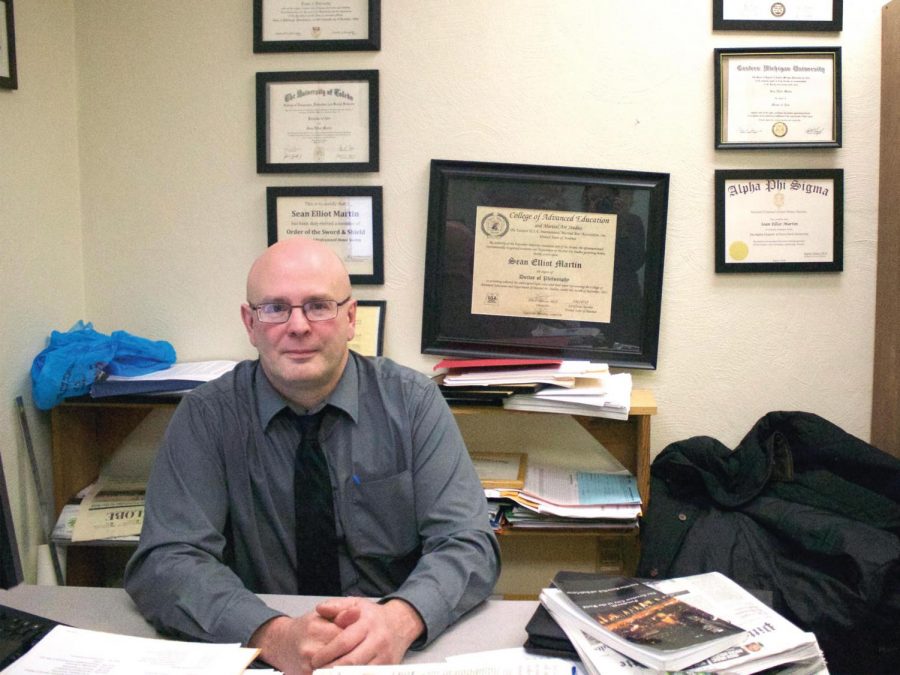Professor uses wide interests to help students
Photo by Lauren Clouser
Dr. Martin, pictured here in his office, sits surrounded by his various degrees and awards.
March 27, 2018
Sean Elliot Martin’s office walls are covered in academic degrees and plaques commemorating his achievements in martial arts, including the new form he created.
“I just can’t decide what to suck at,” Martin joked.
Martin is currently a full-time instructor in the Criminal Justice and Intelligence Studies Department at Point Park, using his different interests purposefully to aid his students in the intelligence field.
Martin’s degrees cover a wide variety of fields including a bachelor’s, master’s and Ph.D. in English, a professional certificate in intelligence, a bachelor’s in psychology, a master’s in environmental science and a doctorate in martial arts philosophy from his martial arts organization, which Martin stressed was not accredited.
“I’ve taught a lot,” Martin said. “I’ve got a lot of experience teaching. I’ve got a decent knowledge based on a whole lot of different stuff. Intelligence is so eclectic, it’s so interdisciplinary, that I think learning a lot of different things helps me to fill in gaps and make connections for my students.”
Martin started out at Point Park 18 years ago as an English professor. In addition to teaching English, Martin also used his martial arts expertise to instruct self defense classes, and met many intelligence majors through the program. The professors in intelligence began to hear about Martin from their students, and eventually invited him to teach intelligence brief writing.
Martin received training and a certificate in intelligence and began to teach intelligence writing. From there, he was hooked.
“Once I started doing this stuff I really fell in love with it,” Martin said.
Martin said he considered quitting his job as a professor and joining the intelligence community as an analyst. He was then approached by Professor Michael Botta, the associate professor and chair of the Department of Criminal Justice and Intelligence Studies.
“Professor Botta called me and said: ‘Hey let’s have breakfast tomorrow, I want to talk to you about something,’” Martin said.
Botta offered him some advice.
“He said, ‘look, I think you would make a great analyst, you could go into the intelligence community,” Martin said. “[He continued] ‘I think you would make a great analyst, but you’re too good of a teacher to quit teaching. Instead of not teaching anymore, why don’t you teach this instead?’ So it was really his idea to start teaching intelligence,” Martin said.
Gabby Widman, a sophomore intelligence and national security major, is currently in Martin’s critical thinking course.
“He definitely knows what he’s talking about,” Widman said. “He has a crazy amount of facts that he throws out.”
Widman said Martin’s wide interests are helpful in the classroom.
“I think he’s talked about psych, criminal justice, intelligence,” Widman said. “That’s good for him to have because when he’s talking in class he’s touching on all aspects like outside of intelligence.”
Martin’s other hobbies include woodworking, international freelance writing, medieval combat games, book writing, acting and martial arts, just to name a few.
Martial arts is one of Martin’s longest-held hobbies. Martin started taking taekwondo courses at age 11 after being inspired by action movies.
“I was a typical stupid kid who just thought it looked cool,” Martin said.
From there, Martin continued to practice and learn new forms.
“My interests evolved dramatically over the years, and I think it’s a lot more noble now,” Martin said. “I mean, not to be dramatic, but it’s about saving lives.”
Eventually Martin began to develop his own form of martial arts called Kage-Essensu, meaning “shadow essence.” The form was officially recognized by the Eastern USA International Martial Arts Association in 2003.
Martin said he founded the style in order to better aid those serving in the military and in law enforcement.
“I’ve been around people in military and law enforcement for a long time,” Martin said. “As I got older I regretted that I hadn’t served in that way.”
Martin still wanted to contribute.
“I wanted to find ways that I could help,” Martin said. “I was too old to join as an enlisted guy at a certain point, obviously, so I thought: ‘How can I make a contribution so I can pull my weight and do my part?’”
Martin realized that the techniques in other forms of martial arts were not always practical enough to be effective in military life-or-death situations.
“When you’ve got real lives on the line this isn’t about looking cool or winning a trophy,” Martin said. “There’s a lot of ego and a lot of posturing and also a lot of adherence to tradition for tradition’s sake, and I try to be the first one to say there could be something better…When it comes to the martial arts, the reason I do it now is primarily to teach people how to save their lives, and in the case of people I train who are professionals, how to save other people’s lives as well.”
Martin worked with his students to perfect the form, which evolved as they found more effective techniques. Martin even consulted with physicians and chiropractors to ensure that certain techniques would have their expected effect.
“I’ve had medical doctors who are horrified,” Martin said. “They say: ‘Wait, what would you do?’ ‘Well in this case I think this would be the medical result if we did this technique.’ And they say: ‘Yeah that’s what it will do alright, but please don’t do that to anybody.”
Martin has instructed Kage-Essensu to not only his students, but to individual members enrolled in the military and police force as well.
Martin described one of his best students, a police officer who signed up for what was considered the most dangerous shift in the city. Martin said the officer would call him every night when he used one of Martin’s techniques. Martin received calls frequently, until the officer called him one last time.
“He actually called me just to say: ‘Hey, I called you to tell you I’m not going to call you anymore when I use these techniques; just assume that I’m using them every night,’” Martin said.
Martin also instructs Kage-Essensu out of his home where he teaches for free or uses the ‘barter system,’ which entails his students helping with woodworking in exchange for his lessons. Additionally, Martin continues to teach weekly classes at Point Park in Kage-Essensu.
Gino Bovo, a longtime friend of Martin’s and the owner of a martial arts studio, has worked together with Martin to instruct before.
“He’s a fantastic instructor,” Bovo said. “Just in the sense of the way he communicates his product. And one of the things I really enjoy about Sean when he teaches is how he’s very entertaining when he presents his product. Sometimes he’s comical about it. He’s never like this ‘Mr. Tough Guy’, he’s very professional.”
Bovo spoke highly of Martin as a friend as well.
“Sean, he’s one of the nicest guys you ever want to meet,” Bovo said. “Very polite, very professional, but a lot of fun…He’s a good guy, a very good guy. I think the world of him.”




















